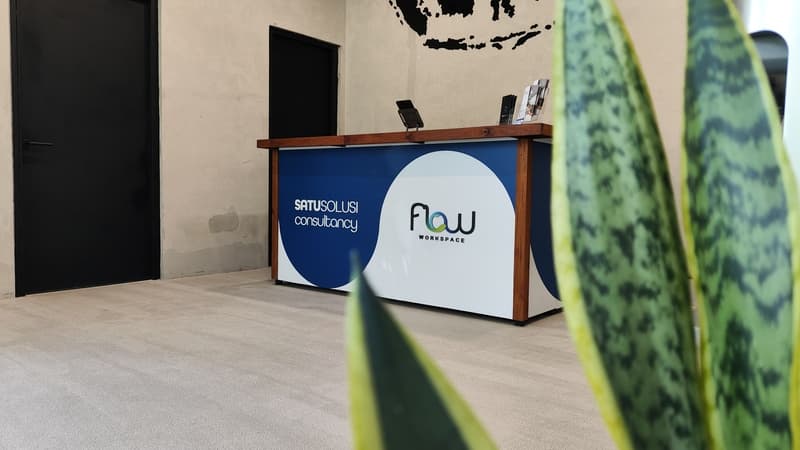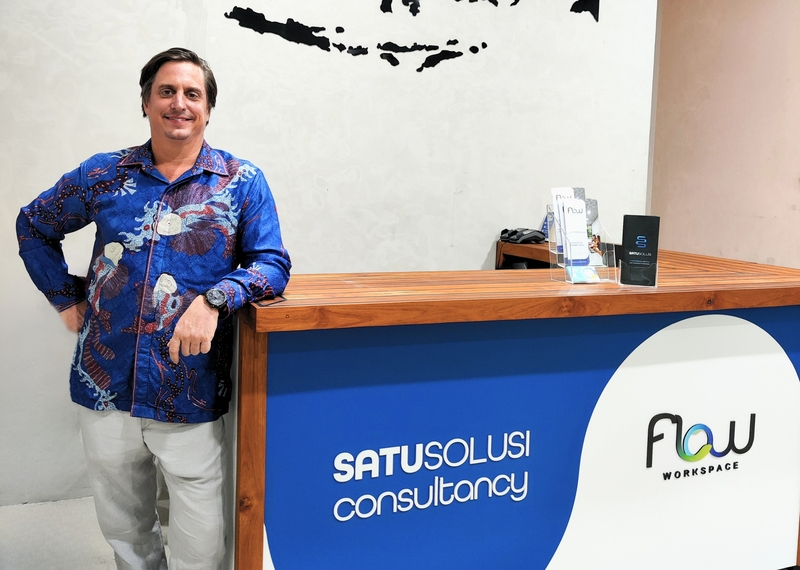For Joris Kolijn, Bali was never part of a calculated career plan, but it quickly became the place where everything clicked.
Over two decades since arriving in Sanur, the Dutch-born entrepreneur has worn many hats: restaurateur, sailing expedition director, land developer, and now, CEO and Co-Founder of SatuSolusi Consultancy and Flow Workspace.
“I’ve always been more of a project guy,” Joris shares. “I like stepping into something, figuring it out, building it up, and leaving it better than when I found it.”
Starting in hospitality, Joris opened his first café just seven months after landing in Bali. But it wasn’t long before he realised his real passion lay in building up, not maintaining. That drive led him into marine tourism with SeaTrek Sailing Adventures, where he rose to General Manager and helped navigate the company through complex transitions.
Just before the pandemic, he pivoted into land development in Flores, working on a 100-plus-hectare eco-resort project. “We were close,” he reflects, “but when COVID came, it all fell apart.” That setback prompted a new direction: launching SatuSolusi Consultancy to help others navigate Indonesia’s complex business landscape. Now, with Flow Workspace in Sanur and a thriving consultancy, Joris builds with clarity.
While walking through the Flow Workspace compound, Joris highlighted the existing layout—a U-shaped cluster of bright, modern coworking areas, including a members-only floor. Construction was underway in some sections, but the vision was clear. He pointed out upcoming additions: an auditorium designed for screenings and seminars, a rooftop space, an outdoor bar, and a public café that will welcome both members and walk-ins.
Can you tell us about SatuSolusi Consultancy?
Our tagline is: We help launch, secure, and scale businesses in Indonesia. The name SatuSolusi means “one solution,” and it reflects why I created the company in the first place. There are plenty of agents and consultants out there, but most tend to operate in silos. Tax consultants only focus on taxes. Legal advisors stick strictly to legal matters, often excluding permits. HR teams look only at employment, and marketing or operations consultants stay in their own lane. Everything is very linear.
The problem is, Indonesia’s bureaucratic environment doesn’t work like that, everything overlaps. Legal, finance, HR, permits; they’re all interconnected, especially for foreign-owned companies.
When I was running companies myself, I noticed these consultants rarely communicated with each other. And for business owners or directors who don’t fully understand how these areas connect, it becomes very difficult to stay compliant and operate effectively. That’s how the idea for SatuSolusi came about: to offer a holistic, cross-functional approach to doing business here.
That’s where the vision came from. We look at the whole business, not just one department. Many of our clients, especially foreign investors, come to us unsure about the system, asking us to handle everything. And while we’re happy to help, I tell them, “We’ll do the work, but you need to understand what your liabilities are and how to stay compliant.” Once that’s clear, we step in and handle the rest.
We built our model around three phases: launch, secure, and scale. The launch phase ensures a business is structured properly from the start, with the right licensing and a long-term vision. Then comes the secure phase, where we focus on compliance: permits, contracts, employment law, and corporate governance. Once that’s solid, we move into the scale phase. This is where we help businesses grow: setting up HR systems, improving ways of working, introducing agile processes, and implementing digital tools to support expansion. That’s where we help them go further.
You’ve built a consultancy that supports everything from due diligence to long-term strategy. How did you shape the scope of SatuSolusi’s services?
Business is ultimately about people and capacity. When we started SatuSolusi, my co-founder and I shared a clear vision: if we wanted to support businesses holistically, we needed to build real internal capacity from day one. Not just say we could “do everything,” but actually have the structure and people in place to deliver it.
One of the first decisions I made was to hire HR first. My co-founder thought it was crazy. “Why would you hire HR when we don’t have any employees yet?” he asked. But that was exactly the point. I wasn’t hiring HR to enforce rules; I wanted to establish a strong cultural foundation. From the way we hire to how we want our team to work and collaborate. That choice, I think, set the tone for how we would grow.
After that came finance, legal, then marketing and operations. Over the past two years, we’ve been focused on building our internal capacity thoughtfully. Many of our early clients came through word of mouth via my existing network, people who were already looking to set up businesses in Indonesia and needed someone they could trust.
Now we’re in a position where we can deliver on what we promise. That’s something I take seriously. Maybe it’s the hospitality background, but I strongly believe in under-promising and over-delivering. And in Indonesia, that’s especially important. It’s a complex environment, so setting clear expectations and maintaining open communication with clients is essential. They entrust us with sensitive information and expect honest, practical advice.
That’s also why we’re being careful not to grow too fast. It’s tempting when there’s a lot of demand, but we’ve seen what happens when companies scale too quickly. Even some of the best tax consultancies here faced chaos when external systems, like government platforms, suddenly changed, and they couldn’t handle the surge. It’s not always their fault; it’s just that rapid growth without the right systems in place can backfire. That’s a pitfall we’re consciously avoiding.
What does a typical engagement with SatuSolusi look like, from first meeting to delivered solution?
We usually begin with an initial onboarding call, which varies depending on the nature of the request. If it’s related to legal, financial structure, or foundational strategy, then I typically handle that first conversation. If it’s more focused on commercial, marketing, or operational matters, my business partner, Christian, takes the lead. We’ve structured things so we can divide and conquer based on our areas of expertise.
In most cases, I’ll do the first call to understand what the client needs. If it’s clear from the outset, we bring in the relevant team and proceed to a more detailed onboarding session, still with my involvement if necessary. From there, we develop a tailored scope of work.
That scope outlines a structured work plan, usually broken down over time. We also provide an option list so clients can pick and choose the services they need based on their goals and budget. Transparency is key for us, so we make sure the pricing and scope are clear from the beginning. Once that’s agreed upon, we get started.
Let’s talk about Flow Workspace. What sparked this project, and how does it connect to your wider mission as an entrepreneur?
Flow Workspace was born out of a practical need. We’re a hybrid company, so we needed a space where we could meet clients and collaborate a few days a week. As we started looking around, we realised that even small ruko units had become surprisingly expensive, offering little in return. That led to a bigger question: Where would I actually want to work? And as a consultant, how would I want to work?
From there, the vision for Flow started to take shape. I asked our team and fellow consultants the same questions: what matters most in a workspace? What would inspire you? We brainstormed everything from essential needs to fun, slightly crazy ideas. Think sleeping pods and massage chairs. It was a collaborative process, rooted in how people actually want to work today.
At its core, Flow Workspace is a place where we want people to get into the flow, both in how they work and how they work together. But it also reflects a deeper mission: to connect people. Bali is home to a vibrant local business community, not just an expat island. One of our goals is to create more interaction between Indonesian and international professionals, promoting Bali and Indonesia as attractive destinations for investment and innovation.
What are the most common blind spots or challenges that foreign entrepreneurs face when setting up or scaling their businesses in Indonesia?
I think the number one issue is miscommunication. Things are getting lost in translation. In my experience dealing with corporate challenges and conflict resolution, most problems stem from people simply not communicating properly.
Indonesia is incredibly diverse, with over 700 local languages spread across more than 17,000 islands. When I was running boats, for instance, the crew came from all over. Some spoke Bajau, others Madurese, Sasak, or Balinese. Bahasa Indonesia was the shared language, but even among locals, miscommunication was common.
That language and cultural gap plays a big role in misunderstandings between foreign entrepreneurs and their teams. On top of that, many people now rely on advice from WhatsApp groups or online forums, often hearing what they want to hear instead of conducting their own thorough, solid research.
To be honest, the clients I enjoy working with most are those who ask tons of questions and do their own homework. That kind of curiosity and diligence is important when navigating a complex environment like Indonesia. Sometimes clients say, “I don’t want to know, just handle everything for me.” But I often remind them before we go further: as a director or company owner, you still have your legal responsibility. We can support and guide you through the process, but you still need to understand the essentials and take ownership of your obligations. You’re going to have to educate yourself, at least on the essential basics.
What are your long-term goals for both SatuSolusi and Flow Workspace?
I enjoy doing projects, so I’ve given myself five solid years to really focus on the business. After that, I hope my team will have grown into independent consultants and entrepreneurs who can take over the broader leadership of the company. At that point, I’d like to step back and start exploring new projects again. Not as many all at once, but one at a time, choosing carefully what I take on.
Ideally, I’ll remain happily involved, but more as a consultant within my own company. Eventually, taking on more of a passive, behind-the-scenes role rather than managing day-to-day operations.
- Email: joris@satusolusiconsultancy.com
- SatuSolusi Consultancy: www.satusolusiconsultancy.com
- Flow Workspace: www.flowworkspacebali.com




